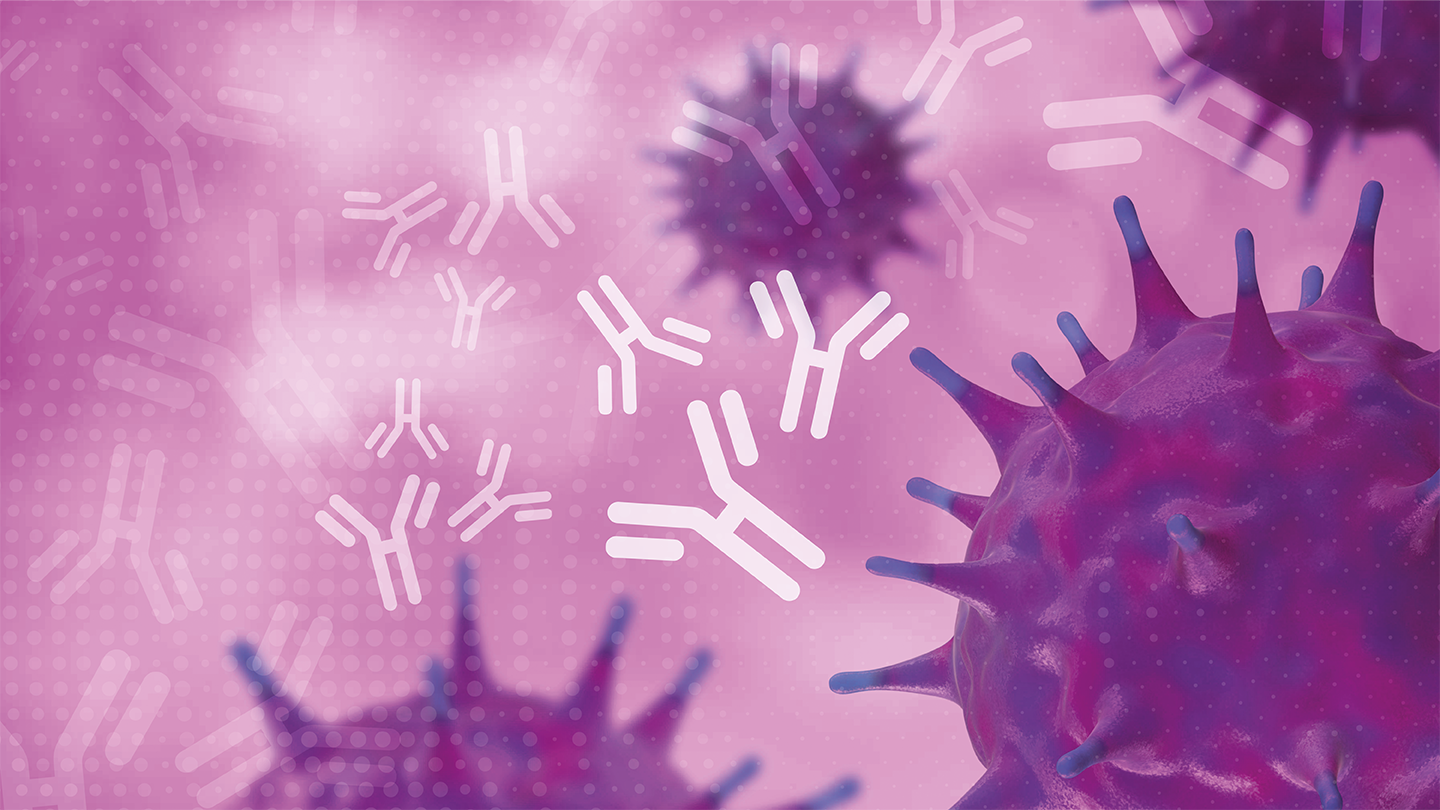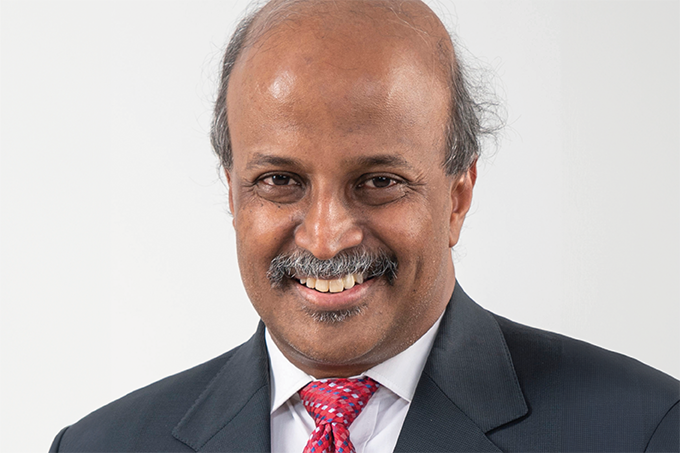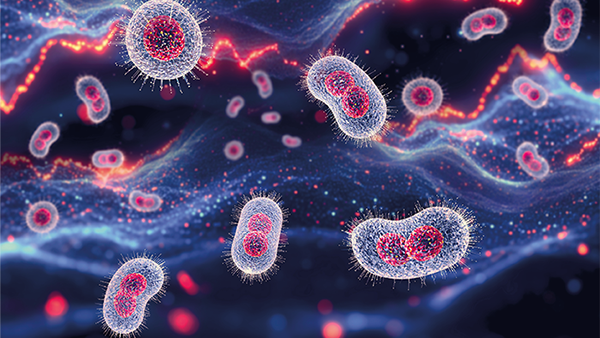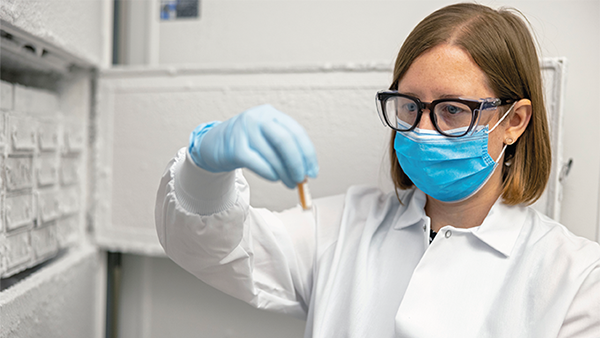Career Stories with Doryan Redding
Learn about life in a blood bank lab
What inspired you to pursue a career as a medical laboratory scientist (MLS)?
I had a family friend who was a laboratory supervisor at one of the hospitals in my hometown of El Paso, Texas. I had expressed an interest in my AP Chemistry class, but I didn’t know how that translated into a profession. When I was 16, she invited me to shadow her in the lab – she gave me a tour and I felt right at home with the rows of microscopes in the hematology department and shelves of donor units in the blood bank. There were even mayonnaise jars in the microbiology department filled with extracted parasite worms. I was instantly hooked!
The more research I did into the profession, the more I learned how critical a role we play in developing the diagnostic picture. Medical laboratory science offers a unique blend of scientific investigation and problem-solving, and the complexity of the work attracted me to it. I thrive on precision and accuracy, and I believe the meticulous nature of laboratory work, where small errors can have significant consequences, tends to inspire like-minded people to join the profession as well.
Please describe a typical day at work – if there is such a thing…
Well, I currently work in the Blood Bank at the University of Virginia (UVA) Health System – a Level 1 trauma, academic medical center. It’s hard to summarize what a typical day looks like. Working in a blood bank can be unpredictable, no matter where you are. The daily routine of any medical laboratory scientist is based on the specific laboratory’s focus, size, and the types of tests being conducted. One day, we could have a very standard day of testing routine patient samples and the next we can be overwhelmed with trauma patients who urgently need blood. There can be cases in the OR that go awry and antibody identifications that puzzle even the most seasoned techs – requiring hours upon hours of work up.
The profession inherently encompasses a lot of scientific procedures coupled with the workflow of healthcare. Some things are universal like daily quality control and instrument maintenance to prepare reagents, solutions, and necessary materials for the day’s testing. Other things are more specialized to each individual facility.
For example, I remember coming to UVA and being surprised that we had procedures and instrumentation for cross-matching platelets. This was shocking because, at my previous facility, I had been trained that platelets are not a blood product that require ABO compatibility. But UVA has a very large patient population who are susceptible to aspects such as the minute HLA antigens on platelets, so we take every precaution.
I’d say that a “usual day” in the Blood Bank here starts by ensuring all necessary equipment and instruments are in proper working order, preparing reagents, solutions, and necessary materials for the day’s testing. Throughout the day we receive patient samples, all the while verifying the accuracy of patient information and labels to prevent sample mix-ups. We always have a constant flow of samples to process, so it’s always a continuous track of setting up tests and running samples 24/7. Upon receiving them, we perform a range of laboratory tests, such as blood typing, antibody identification, and crossmatching patient samples to donor units while implementing quality control measures to validate the accuracy and precision of testing methods.
We monitor equipment performance through routine quality control checks and calibrations and troubleshoot any issues that arise during testing and take corrective actions when necessary. Throughout the day, we collaborate with other healthcare professionals, such as our pathology residents, nurses, and doctors, to provide crucial diagnostic information.
UVA prioritizes providing us with the latest advancements in laboratory technology, techniques, and medical knowledge, so some days we are provided opportunities for continuing education (CE). The medical field is always evolving – and medical laboratory scientists are eager to stay updated with the latest advancements. Our passion for lifelong learning keeps us engaged and motivated.
At the end of the shift, we handover to the next crew, and I look forward to doing it all over again the next day.
What’s your favorite aspect of your work?
My favorite part of work is seeing how devoted my coworkers and I are about doing a good job. We all understand that our work directly influences patient diagnoses, treatment decisions, and overall healthcare outcomes. We take pride in knowing that the accurate and reliable test results we produce contribute to saving lives and improving patient wellbeing. This field offers a diverse range of tests and specialties, and this variety allows us to explore different areas of interest and expertise.
I can never see myself getting bored in my career; if something isn’t working out, be it the place or the work I’m doing, there’s always an opportunity to switch things up! Simply moving down the hall (which can take me from blood bank to microbiology) is enough to keep anybody on their toes.
I surround myself with professionals who are incredibly dedicated to the profession. If the entire blood bank is completely swamped because we were setting up Massive Transfusion Protocol coolers all day long, we take it in stride. We are actively participating in life-saving care and we always take a moment at the end of each day to reflect on how our work made a difference. Although our work often happens behind the scenes, we understand the critical nature of our role in healthcare. Many professionals take pride in being acknowledged and appreciated for their contributions to patient care, especially when working behind the scenes because we don’t see it often. But when an overwhelmed nurse from the OR comes back the next day to tell us that the work we put in was vital to keeping a patient alive, it just reinforces why we do it.
As a student, what was the biggest misconception you had about life in the lab?
Given the amount of stress that was placed on understanding how diagnoses were related to our lab results, I was under the impression that we would have a more active role in the diagnostic process. The Clinical Laboratory Science program at Texas State – and specifically the American Society for Clinical Pathology Board of Certification exam – was heavily focused on diagnostics and clinical presentations. In reality, our role is truncated by the walls between us and the rest of the hospital.
When I was still a student, I would get excited whenever my family members would get labs drawn and I would jump at the chance to say what every single analyte and reference range meant and how it was associated with what function of the body. Today, I struggle to remember those things because I haven’t used any of that information in practice. We are not able to provide the patient care team any ideas on what we think of the results our testing produces; if I were to result a positive Direct Coombs Test on an infant that I know may be indicative of autoimmune hemolytic anemia, it would not be within my role to say so due to restrictions. This leads some people to underestimate the education level of our staff – they think we just put samples on instruments and push buttons; in fact, we just aren’t allowed the opportunity to play a bigger role.
How can the medical laboratory increase interest and recruitment in the field?
I find myself asking this question way more than you might think! Promoting the profession is what I love to do on my podcast, Off the Bench by the American Society for Clinical Laboratory Science (ASCLS); I have a passion for professional advocacy and being on the ASCLS Marketing and Communications committee gives me that opportunity. The message is necessary for prospective students who we hope join the profession and for people currently in healthcare. (We actually just talked about this on our September episode!)
It is incredible to be such a crucial part of the patient care process, yet patients and healthcare workers don’t understand what we do – not even the physicians who work directly with us to diagnose. We see ignorance all the time. We’ll receive orders in the lab for STAT urine or blood cultures and receive calls about why tests are taking so long when the results are needed now. But there is no such thing as a STAT culture. We have a laugh about it in the lab and they become running jokes, but it really is unfortunate. It all comes down to education! It’s not that people are actively going out of their way to not know who we are or what we do, it’s that we haven’t provided them enough resources or made the information readily available to them on a platform where it is accessible to them.
Communication is key and we have to do a better job at promoting ourselves. This profession attracts intelligent, highly skilled people but, as a whole, we are made up of introverts. There are many more individuals who are passionate about our profession than you think, they just lack a platform.
Many high schools include career preparation in their curriculum and there is no reason why medical laboratory science shouldn’t have a voice in that discussion. Volunteering in local career fairs can make a big difference in simply increasing our profession’s brand and visibility. I am able to promote advocacy and recruitment for the profession on a small scale with students and new hire training here at UVA, while my involvement with ASCLS allows me to reach people on a larger scale. We are all energized to spread the word about what we do and why one would enjoy being part of this team.
Making an effort to meet the younger generation where they are on social media can hugely impact how we interact with this demographic. We want to make them aware of what it takes to make it into the profession, and there really is an opportunity here to leverage this online presence for professional growth. Future generations need to know how important this part of the medical community is for good quality health care.
How does the lack of appreciation for the lab impact your work?
Medical laboratory science is a severely underappreciated profession, which leads to some serious burnout and cynicism among the lab community. People are familiar with doctors, nurses, nutritionists, and physical therapists, but if you ask kids in high school what an MLS is, they will probably reply that it’s some sort of disease. We need to make the next generation more aware of our profession; without them, our critical staffing shortage will continue to get worse.
Even after the main stressors from COVID-19 had passed, I realized people were still having to manage a heavy workload. I came out of school bright eyed and bushy tailed, ready to join the field – this profession saves lives and you get to play a medical detective. I couldn’t wait to start! However, burnout is real. I would like there to be a better understanding of the vital role we play so that we can recruit and retain the best and most motivated people under good working conditions.
What advice would you give to students considering a career as an MLS?
If you like an organized yet challenging environment, medical laboratory science is for you. But I have a few pieces of advice:
- Get used to wearing gloves and masks.
- Be confident in your decision making.
- You have to have a strong backbone to believe that you will be successful in this profession.
- Recognize that everyone is human and not machines.
- We all make mistakes, but you can learn from them and it’s just part of the process of getting acclimated.
- Find ways to decompress outside of work – it makes you a better team player at work.
By joining the profession, you’re signing up for years of interesting experiences. You will make a good living and, if you like to travel, you can make an even better one. Plus, you will never be unemployed unless you choose to be. Now, you can use those science skills that you love so much to actually make a difference in people’s lives. In the end, that’s priceless.
Interested in learning more about Doryan’s journey? Read about her experience of entering the workforce during the COVID-19 pandemic here.





